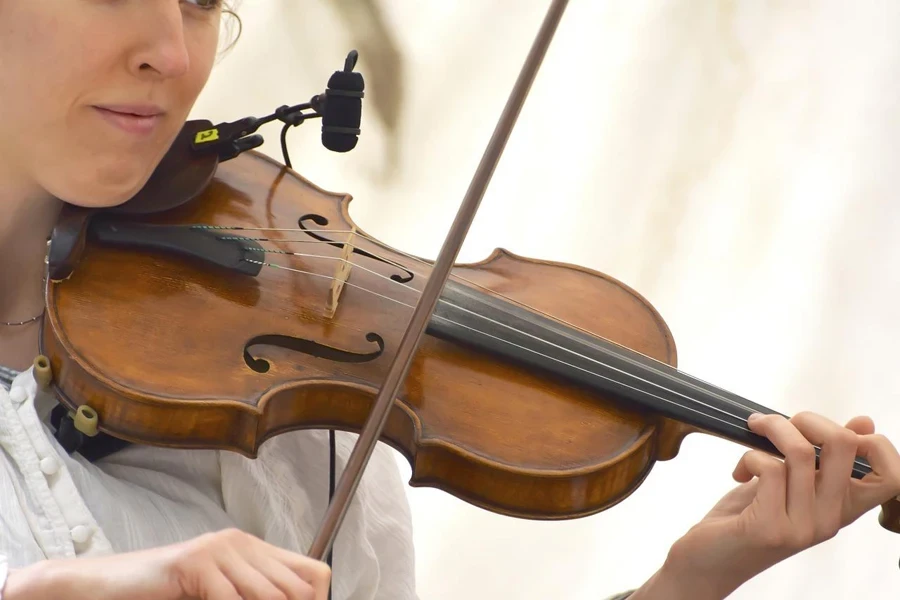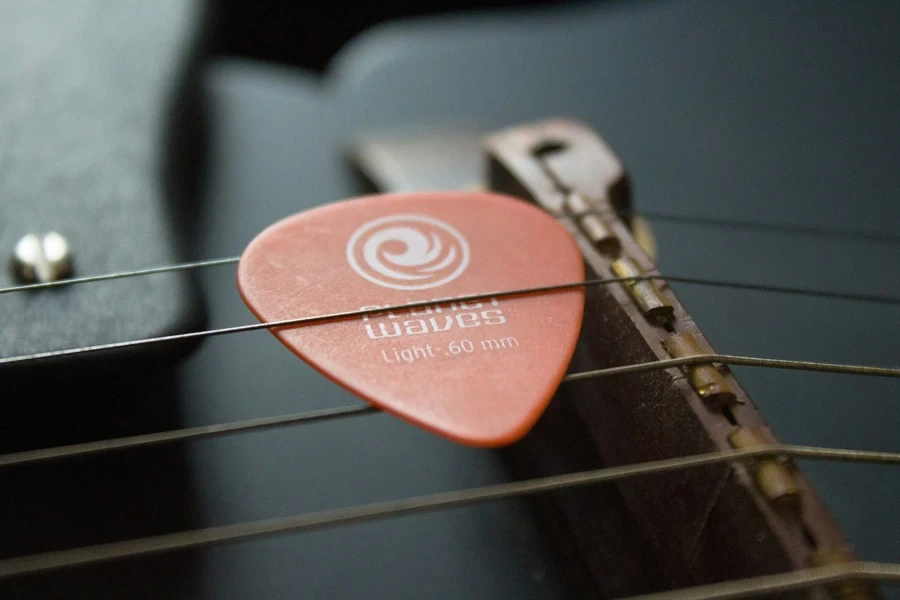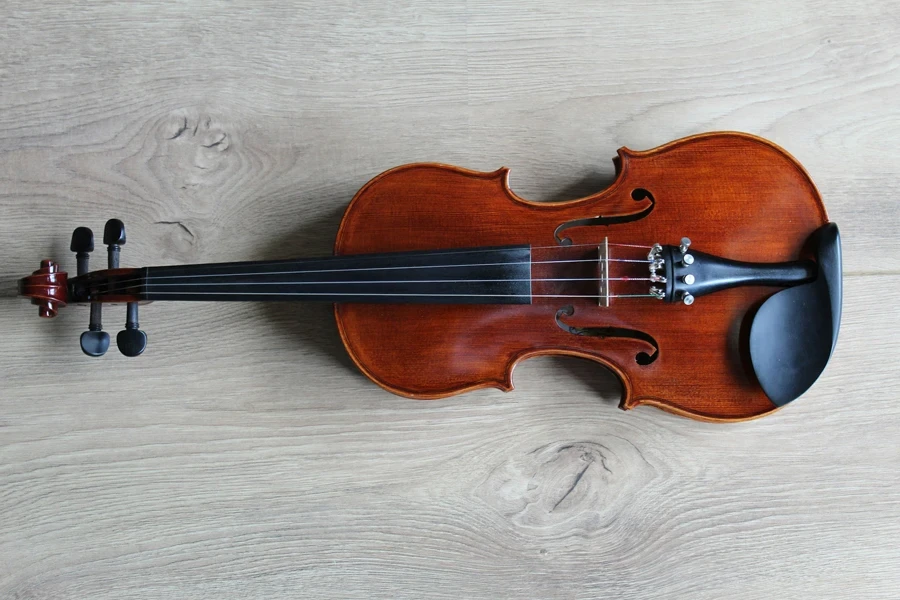Table of Contents
● Introduction
● Market overview: current trends and growth
● Things to consider when selecting quality accessories
● Top models and must-have features for musicians
● Conclusion
Introduction
Demand for high-quality accessories that enhance stringed instruments’ sound, functionality, and longevity is rising among musicians at all levels. From advanced strings and ergonomic rests to protective cases, these accessories support both performance and durability, giving players more comfort and sound consistency. As new innovations emerge, musicians are increasingly able to customize their setups, making quality accessories essential tools for achieving optimal playability and tone.

Market overview: current trends and growth
The global stringed instrument accessories market reached approximately $19.4 billion in 2023 and is projected to grow at a CAGR of 7.4%, potentially exceeding $27 billion by 2030. This market expansion is driven by a rising demand for quality accessories like strings, ergonomic rests, and durable cases. Asia-Pacific commands the largest market share, comprising over 40%, fueled by increased participation in music education in regions like China and India. In North America, where the market is valued at over $5 billion, demand is bolstered by cultural connections to genres such as jazz, folk, and classical music, which heavily feature stringed instruments, according to sources from Fortune Business Insights and Grand View Research.
Major brands like Yamaha, D’Addario, and Fender are leading this sector through innovation in materials and design, responding to consumer preferences for enhanced sound quality and playability. For instance, D’Addario’s synthetic core strings have become popular for their durability and warm tone, aligning with the growing trend for high-performance, ergonomic accessories. Online sales channels are expanding rapidly as more musicians turn to digital platforms for convenience. This shift to online channels allows both amateurs and professionals easier access to premium products, which is expected to drive continued growth in the sector according to reports from Fortune Business Insights and Grand View Research.

Things to consider when selecting quality accessories
When selecting accessories for stringed instruments, material and build quality are crucial factors, particularly for cases, strings, and bows that endure frequent handling and environmental stress. Durable, weather-resistant materials like carbon fiber and reinforced polymers are preferred for cases, as they provide both impact resistance and protection from humidity and temperature fluctuations, which can otherwise damage wood and metal components. According to Simply for Strings, musicians value high-quality materials in strings, like synthetic cores, which enhance tone consistency and reduce breakage.
Comfort and fit are also essential, especially for accessories like shoulder and chin rests for violins and violas, which directly impact posture and playability. Accessories tailored to individual body shapes minimize strain, allowing musicians to play longer with less discomfort. For example, products like the Wittner chin rest are designed to reduce jaw and neck tension, which benefits both beginners developing proper posture and experienced players managing long practice sessions, according to Music & Arts.

The integration of technology and innovation into stringed instrument accessories has introduced new tools that enhance both practice and performance. Digital tuners and smart bows offer real-time feedback, helping musicians tune accurately and improve technique. AI-enabled learning tools are particularly popular among students and self-learners, as they adapt to skill levels and track progress over time. According to Fortune Business Insights, these tech-driven products reflect a growing trend toward interactive, user-friendly accessories that support musical growth.
Finally, budget and product longevity are important considerations, especially for musicians seeking cost-effective solutions that offer durability. While premium accessories might require a larger upfront investment, they often provide superior performance and longevity, making them more economical over time. For example, products like synthetic strings may cost more initially but are often less prone to damage and require fewer replacements, supporting a balance between cost and quality.

Top models and must-have features for musicians
Top-rated stringed instrument accessories are designed to address the unique needs of each instrument, enhancing performance and usability for both beginners and professionals. For violins and violas, top choices include D’Addario strings, known for their durability and tonal quality, and Wittner chin and shoulder rests, which reduce strain and enable prolonged practice sessions. Cellos and basses benefit from robust rockstops that prevent instrument slipping, and cases made from carbon fiber or composite materials that offer superior protection during transit. Products like the Karl Willhelm bow are especially popular among intermediate to advanced players due to their balance, tone enhancement, and durability, which significantly improve playing experience, as Simply for Strings and Music & Arts highlight.
Skill level-specific accessories are essential, especially as musicians progress. Beginners often start with standard rests, strings, and cases, focusing on essential accessories like a well-fitted shoulder rest that fosters proper technique. As players advance, more tailored accessories, such as professional-grade bows, enhanced rosin, and custom-fit rests, become vital, allowing for more nuanced tone control and comfort. High-performance accessories like synthetic core strings are preferred by professionals for their stability and reduced sensitivity to humidity and temperature changes, making them ideal for frequent practice and performance, as noted by sources including Simply for Strings.

Certain features remain highly sought-after across skill levels, particularly those that offer improved sound quality and ease of maintenance. Synthetic core strings, for example, have gained traction due to their stability and ability to withstand environmental changes, reducing the frequency of tuning adjustments. Lightweight, durable cases made from carbon fiber, now standard among traveling musicians, provide high-impact protection without adding bulk. Additionally, digital tuners with advanced features, such as automatic calibration, and AI-driven learning tools for beginners, have become popular for helping musicians improve pitch accuracy and receive real-time feedback, according to Simply for Strings and Fortune Business Insights.
For players looking to streamline their accessory purchasing, subscription services are emerging as a convenient option. Leading brands now offer subscription-based access to essential items like strings, rosin, and cleaning supplies, ensuring that musicians consistently receive the products they need without the hassle of individual purchases. This model not only ensures consistent quality but also fosters customer loyalty by offering personalized recommendations and scheduled deliveries, as Simply for Strings indicates.

Conclusion
High-quality accessories play an essential role in supporting musicians of all levels, enhancing both the functionality and experience of stringed instrument performance. As market demands shift, the focus on innovative materials, ergonomic designs, and tech-enabled features continues to grow, allowing musicians to enjoy greater comfort, convenience, and sound quality. With options that cater to a range of budgets and skill levels, today’s accessory market emphasizes customization and adaptability, making it easier for musicians to find products that meet their unique needs and preferences.





 বাংলা
বাংলা Nederlands
Nederlands English
English Français
Français Deutsch
Deutsch हिन्दी
हिन्दी Bahasa Indonesia
Bahasa Indonesia Italiano
Italiano 日本語
日本語 한국어
한국어 Bahasa Melayu
Bahasa Melayu മലയാളം
മലയാളം پښتو
پښتو فارسی
فارسی Polski
Polski Português
Português Русский
Русский Español
Español Kiswahili
Kiswahili ไทย
ไทย Türkçe
Türkçe اردو
اردو Tiếng Việt
Tiếng Việt isiXhosa
isiXhosa Zulu
Zulu